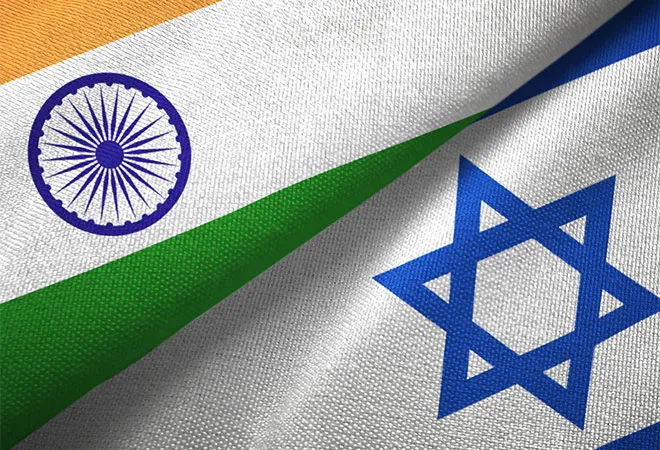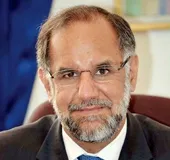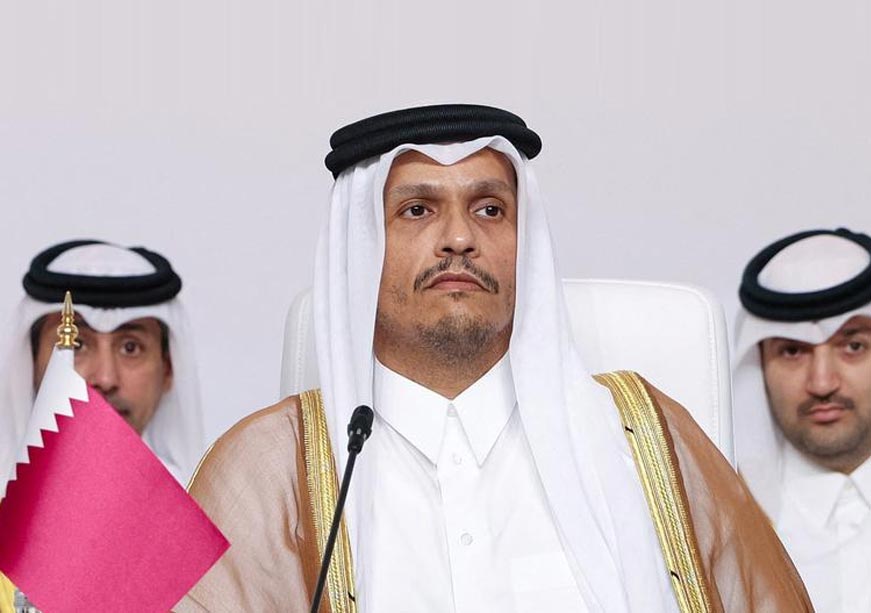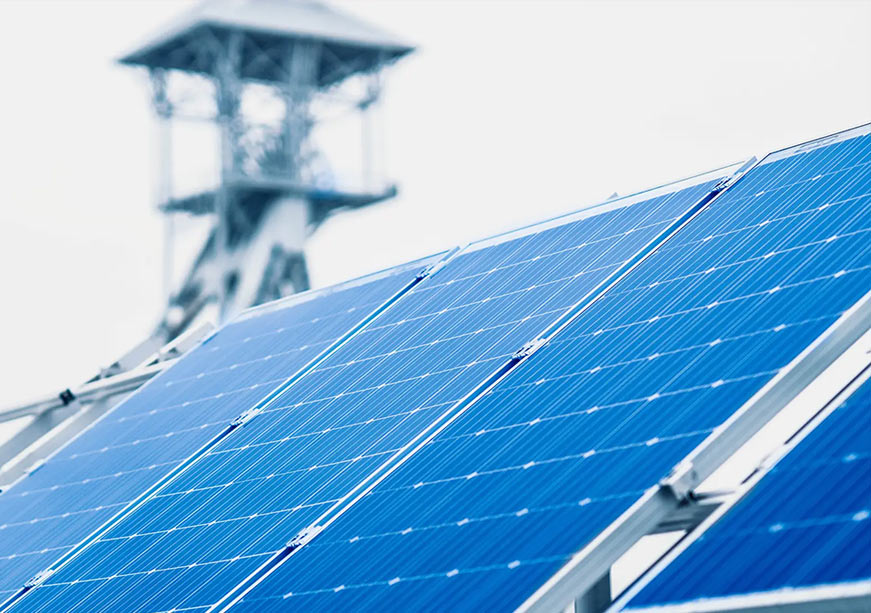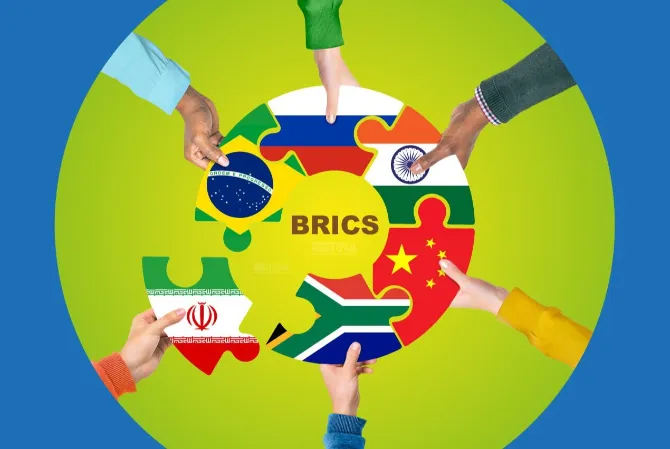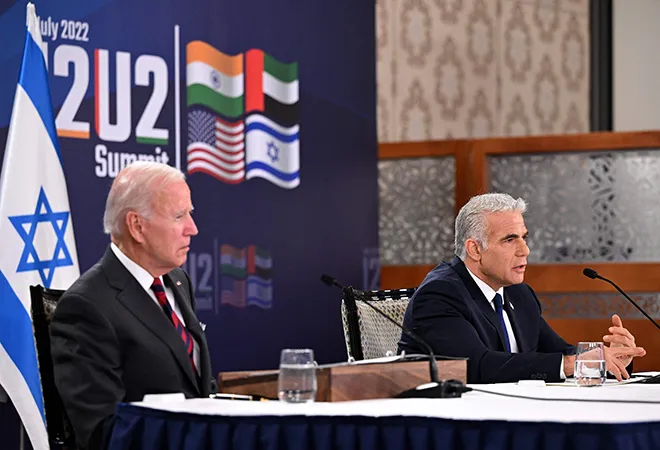India's de-hyphenation policy in West Asia has been instrumental in sustaining bilateral ties with Israel.
India and Israel celebrated the 30th anniversary of full diplomatic ties earlier this year with flag colours illuminating historic landmarks in both countries. They also launched a commemorative logo featuring the Star of David and the Ashoka Chakra, symbolising strong friendship and admiration between the two nations. Although India recognised Israel in 1950 and permitted an Israeli consulate to function in Mumbai, it held back from establishing full diplomatic relations until 1992 because of its support for anti-colonial movements and its close ties with Arab countries. Even after 1992, there was a dearth of high-visibility visits, especially from the Indian side. Between 1998 and 2014, the foreign minister’s visits in 2000 and 2001 were the highest-level visits ever made to Israel.
Although India recognised Israel in 1950 and permitted an Israeli consulate to function in Mumbai, it held back from establishing full diplomatic relations until 1992 because of its support for anti-colonial movements and its close ties with Arab countries.
This changed when Pranab Mukherjee became the first Indian President to travel to Israel in 2015 followed by the breakthrough visit of PM Modi in 2017 and Benjamin Netanyahu’s reciprocal visit in 2018. These visits marked a paradigm shift in bilateral ties and a growing strategic partnership expanded from strong military cooperation as seen in Israel’s assistance to India during its war against China in 1962, and against Pakistan in 1965, 1971, and 1999—to one focusing equally on economic development and technology.
Growing economic partnership
Bilateral trade has increased and diversified (to include electronic machinery, nuclear products and medical equipment—Table 1 and 2) from US$900 million in 2000 to US$7.86 billion in 2021 (Graph 1). Furthermore, investments in the start-up and tech ecosystems have become quite significant. The total Israeli investments in Indian projects till 2021 have been valued at US$270 million, with Teva Pharmaceuticals, Ecoppia, and Naa’n Dan Jain being the top three notable investors in the clean energy, water management, and health domains. Graph 1: Total Trade between India and Israel (in US$ million)
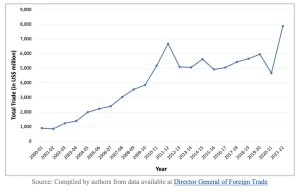
Table 1: Top 10 items of export from India to Israel
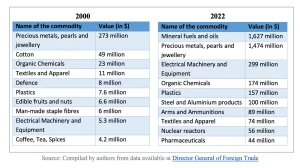
Table 2: Top 10 items of import from Israel to India
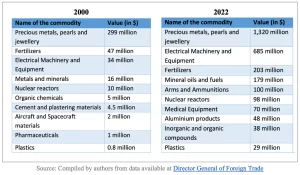
In the past two years, multiple MoUs have been signed between Israel’s Start-Up National Central and Indian entrepreneurship centres like iCreate and TiE. Venture Capitalists have shown keen interest in funding tech start-ups, and mergers have emerged as viable business models for Indian companies looking for tech-based solutions and Israeli firms wanting bigger markets. As a result, offices of big Indian tech firms like TCS, Infosys, and Wipro have found their way to Tel Aviv’s commercial streets. The Adani Group’s acquisition of Haifa Port (the second largest port in Israel) added a new logistics dimension to the economic partnership. Fast-tracking their tech relationship, the two countries recently widened the scope of the India-Israel Industrial R&D and Innovation Fund (I4F) to include sectors like renewable energy and ICT through increased participation of academia and business entities. In March 2021, Indian oil and gas giant-IOCL launched a joint venture with Israeli start-up—Phinergy to manufacture aluminium-air battery systems in India to promote green mobility.
Water and agriculture
A unique aspect of Indo-Israel ties is their growing collaboration in the areas of water and agriculture since 2017. Given Israel’s impressive track record of reusing 90 percent of its wastewater, Indian authorities have partnered with Mashav, Israel’s international development organisation, to combat a looming water crisis. Currently, there are over 30 Israeli projects in India looking at various aspects including water distribution and management, leak detection, wastewater treatment, desalination, and water security. Not only have public-private partnerships in drip irrigation and desalination projects been successful, but university collaborations have also shown promising results in the past three to four years. Tel Aviv University has partnered with Amrita University, Kerala to work on water quality monitoring; with Thapar University, Punjab, it is looking after wastewater treatment of sewage ponds, and with IIT Madras, it is developing technologies for water purification.
Given Israel’s impressive track record of reusing 90 percent of its wastewater, Indian authorities have partnered with Mashav, Israel’s international development organisation, to combat a looming water crisis.
India is the only country where Israel has stationed a water resources specialist as the Water Attaché at its embassy in Delhi who spearheads Israel’s participation across four pillars—agriculture, industry, nature, and urban consumption. It is also developing capacity-building programmes through joint water technology centres for government officials with the larger objective of achieving a trickle-down effect in this sector. With respect to agriculture, the Indo-Israeli Agricultural Project (IIAP) operates 29 Centres of Excellence (CoEs) across 21 states in India. Their main focus areas include vertical farming, soil solarisation, and increased productivity. These centres specialise in the cultivation of different crops such as vegetables, mangoes, citrus fruits, and non-farming activities like beekeeping and animal husbandry. It is estimated that every year these CoEs produce 25 million high-quality vegetable seedlings, and 400,000high-quality fruit plants while providing training to large numbers of Indian farmers with the latest technologies.
Defence and security
India is one of the largest importers of weapons from Israel, contributing to about 40 percent of its annual arms exports. The net worth of Israeli fully-formed armaments and prime subsystems supplied to India since 1992 is estimated to be about US$40 billion (Chaudhuri and Rein 2022). Their defence partnership also extends to sharing of crucial technologies by Israel for missiles, electronic warfare systems, radar systems, navigation systems, and weapon control systems designed and produced by DRDO. India’s shift towards self-reliance in recent years has resulted in joint defence ventures being set up. The recently signed India-Israel Vision on Defence Cooperation is a step forward in this direction. State-of-the-art arms systems such as Barak 8 surface-to-air missiles, Skystriker drones, and Travor Assault Rifles are some of the products of the co-production and development initiative undertaken by the two countries. Within the security domain, a promising area of cooperation that has come up is that of cybersecurity. In his 2017 visit, PM Modi acknowledged the potential of such a partnership. Since then, various Israeli unicorns such as Wiz, Orca Security, and Coralogix have opened up operations in India. In 2020, Israel’s National Cyber Directorate (INCD) and Indian Computer Emergency Response Team (CERT- In) signed an MoU to exchange information on cyber threats and build a framework to enhance capacity-building initiatives. Taking this forward, in March 2022, Maharashtra Institute of Technology, Pune organised a Cybersecurity Bootcamp with an Israeli cyber education firm ThriveDX to boost cybersecurity awareness among university students and working professionals.
State-of-the-art arms systems such as Barak 8 surface-to-air missiles, Skystriker drones, and Travor Assault Rifles are some of the products of the co-production and development initiative undertaken by the two countries.
De-hyphenation at work
India’s partnership with Israel has clearly flourished once it started to actively delink the Israeli-Palestinian conflict from its relations with the two parties. The current government has made conscious efforts to make both relationships direct and visible, less linked to one another while ensuring that neither enjoys a veto against the other. An example of this was seen when PM Modi did not combine his 2017 visit to Israel with one to the Palestinian authority in Ramallah but chose to make a separate visit in 2018. At the same time, India has continued its principled support for a Palestinian State. It has even voted against Israel on numerous occasions. In 2014, it voted in support of a UNHRC resolution to launch a probe into Israel’s offensive on Gaza and in 2015, India voted against Israel over another resolution condemning human rights violations in Palestine. Thereafter, in 2021, it backed two other resolutions—one on the right to self-determination of the Palestinian people and the other on Israeli settlements in East Jerusalem.
Looking ahead
The two countries have come a long way since the inception of formal diplomatic ties in 1992 and particularly during the eight years of Prime Minister Modi’s government.
The current government has made conscious efforts to make both relationships direct and visible, less linked to one another while ensuring that neither enjoys a veto against the other.
Going forward, a Comprehensive Free Trade Agreement that includes trade in services would give a boost to the economic relationship. In the water sector, India can capitalise on Israeli tech to develop a centralised platform for water solutions catering to different regions. In the cybersecurity domain, the focus can shift to deepening A2A collaboration through joint doctoral fellowships, while encouraging the private sector to play a more active role in the partnership. Tower Semiconductor’s plans to set up a chip-making foundry in India are likely to benefit from India’s Production-Linked Incentive scheme to reduce dependence on China. India can work with Israel to develop nano and radar-enabled satellite systems The Abraham Accords and the new I2U2 grouping have created new opportunities for expanding the relationship at a trilateral and plurilateral level. The first two I2U2 projects will marry Israeli and US technology platforms with the United Arab Emirates’ capital to bring ambitious food security and clean energy projects to India. Successful execution of these pilot projects will open the doors for others in areas of transport, healthcare, and more. As it enters into its fourth decade, a relationship described by former Israeli PM Benjamin Netanyahu as a “marriage made in heaven” seems to be getting stronger with time.
Hargun Sethi is a Research Intern at ORF.
